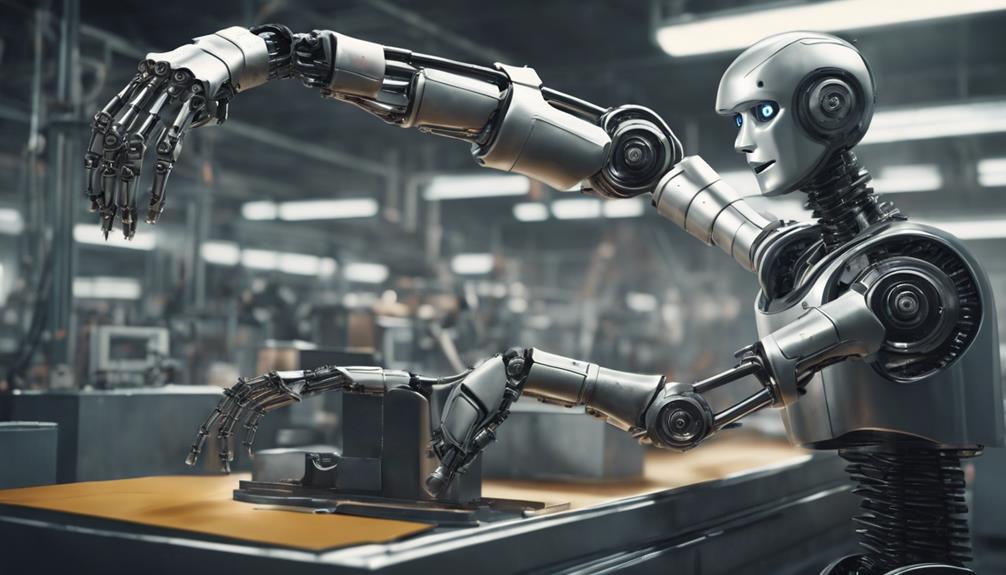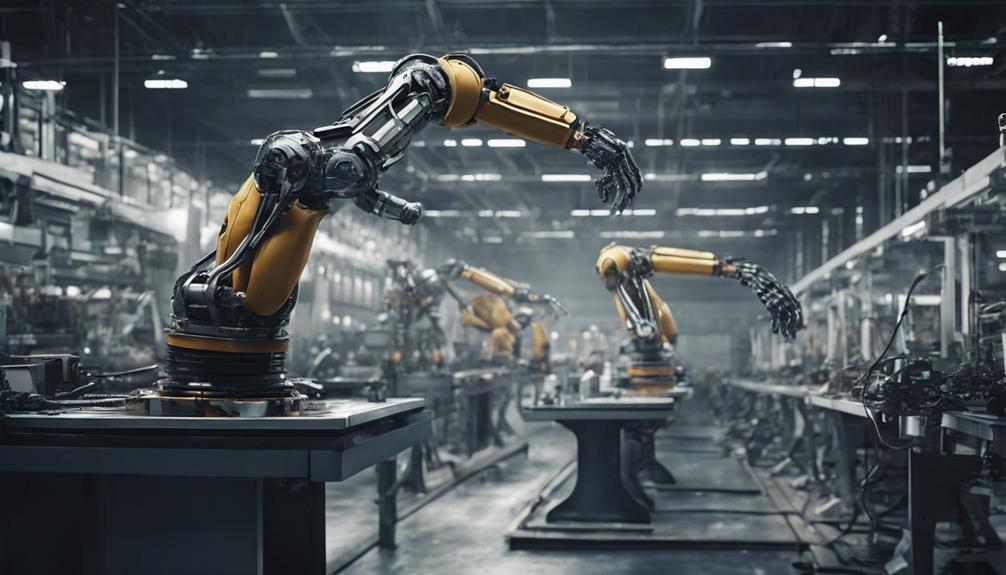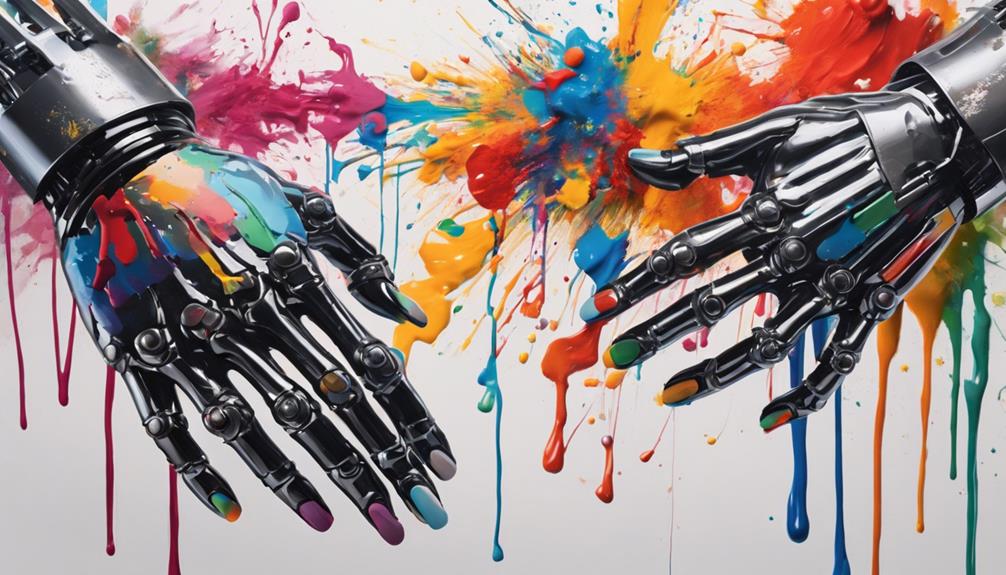In today’s rapidly evolving landscape, the integration of artificial intelligence is fundamentally transforming the traditional labor market as we know it. As automation becomes more prevalent across different industries, the impacts on job displacement and transformation are profound.
The looming question remains: how will individuals navigate this shift towards a more automated future? Let's explore the nuanced impacts and strategies essential for individuals to stay ahead in an era where AI continues to redefine the nature of work.
Key Takeaways
- AI reshapes job market, displacing millions by 2025.
- Upskilling essential to adapt to evolving job tasks.
- New job roles emerge with AI integration.
- Automation threatens some jobs but creates opportunities for skilled workers.
Impact of AI on Job Market
The advent of artificial intelligence (AI) is poised to significantly reshape the landscape of the job market, with projections indicating the potential displacement of 85 million global jobs by 2025 across diverse sectors such as healthcare, agriculture, and industrial fields. This anticipated shift raises concerns about the future of workers whose roles may be at high risk of being replaced by AI. As AI continues to evolve, it is expected to impact job tasks, necessitating the acquisition of new skills by workers to adapt to the changing job market. The introduction of AI is not merely about the replacement of jobs but also about the emergence of new types of jobs that align with the capabilities of this technology.
As companies increasingly integrate AI into their operations, the demand for workers with AI-related skills is on the rise. This rapid transformation underscores the importance of proactive upskilling and reskilling initiatives to equip workers with the necessary competencies to thrive in a job market influenced by AI. In essence, the impact of AI extends beyond job displacement to a fundamental restructuring of job tasks, creating both challenges and opportunities for workers in various industries.
Jobs at Risk of Automation

Numerous occupations across various industries face the imminent risk of automation as artificial intelligence continues to advance and reshape the job market landscape. The impact of automation is evident in various sectors, with specific jobs facing a higher risk of being replaced by AI tools and machine learning algorithms.
- Customer Service Representatives: Automation and chatbots are increasingly handling inquiries, leading to the potential replacement of customer service representatives by AI, especially in roles that involve repetitive tasks and basic issue resolution.
- Car and Truck Drivers: The rise of autonomous vehicles is reducing the need for human drivers, putting jobs in transportation at risk of automation. This shift could significantly impact individuals employed in driving roles.
- Computer Programmers: AI tools like generative AI have the potential to automate coding tasks, impacting jobs in computer programming that require a high level of technical skill and expertise. As AI continues to evolve, white-collar jobs that were once considered safe from automation may face increasing threats, emphasizing the importance of developing soft skills and emotional intelligence alongside technical proficiency.
Benefits of AI in Workplace
With the proliferation of artificial intelligence (AI) technology, workplaces are experiencing tangible benefits that enhance operational efficiency and introduce new job opportunities. AI saves time by automating repetitive tasks and processes, allowing human workers to focus on more strategic and creative endeavors.
By analyzing data and providing valuable insights, AI algorithms enhance workplace efficiency, driving businesses towards success. This technology creates new job roles such as machine learning engineers and AI ethics specialists, reflecting the evolving demands of the market. The demand for workers with the skills needed to develop, implement, and monitor AI systems is on the rise, indicating a shift towards a more tech-savvy workforce.
While AI enhances efficiency, the human touch remains essential for tasks that require empathy, creativity, and critical thinking. As market trends continue to embrace AI, the collaboration between AI technology and skilled workers opens doors to new opportunities, emphasizing the importance of mental health and well-being in a rapidly changing work environment.
Jobs AI Won't Replace

In the evolving landscape of automation and artificial intelligence (AI), certain professions stand resilient against technological displacement due to their reliance on intricate human qualities and interactions. These professions include:
- Teachers: The role of a teacher involves not only imparting knowledge but also providing mentorship, guidance, and personalized support to students. AI may assist in certain aspects of teaching, but the human touch and emotional intelligence teachers bring to the classroom are irreplaceable.
- Nurses: Nurses play a vital role in healthcare, requiring empathy, critical thinking, and quick decision-making in high-pressure situations. The compassionate care and human connection they offer to patients are intrinsic to the nursing profession, making it less susceptible to automation.
- Therapists: Therapists rely on deep emotional intelligence, empathy, and the ability to establish trust with their clients. The nuanced understanding of human behavior and individualized care they provide cannot be replicated by AI. Therapy sessions necessitate a level of creativity and adaptability that machines currently cannot match.
These professions highlight the significance of human interaction, quality, creativity, and emotional intelligence in roles that involve healthcare, education, and personal services, making them less likely to be fully replaced by AI.
How to Prepare for Automation
Preparation for the upcoming wave of automation necessitates a strategic focus on upskilling in critical areas and fostering adaptable soft skills in order to thrive in the evolving job market landscape shaped by AI.
According to the Pew Research Center and the Future of Jobs Report, individuals can prepare for automation by developing new skills such as critical thinking and tech proficiency. Embracing lifelong learning and adaptability are essential strategies for success in an automation-driven job market.
Market research indicates that specializing in AI-related fields and staying abreast of emerging technologies can significantly enhance competitiveness. Programs offering AI specializations, such as those available at institutions like Nexford University, can equip individuals with the necessary tools to navigate the changing job landscape.
Frequently Asked Questions
Is AI Going to Take My Job?
The impact of AI on job displacement is a pressing concern for many individuals. As AI technology advances, certain roles may face automation, necessitating a proactive approach to upskilling and adapting to emerging job market trends.
How AI Is Replacing Jobs?
AI is replacing jobs by automating repetitive tasks in various industries, from customer service to transportation. This shift is driven by advancements in technology that enable machines to perform functions traditionally done by humans, leading to workforce disruptions.
What Jobs Will Be Most Affected by Ai?
Roles most impacted by AI include customer service representatives, drivers, programmers, research analysts, and paralegals. Automation and AI technologies are reshaping these professions through enhanced efficiency, potentially leading to workforce changes and redefining job requirements in the future.
How Does AI Affect Job Opportunities?
AI significantly impacts job opportunities by automating tasks, leading to job displacement in various industries. However, AI also creates new roles, such as machine learning engineers and AI ethics specialists, presenting fresh job prospects amidst technological advancements.
Conclusion
In conclusion, the rise of artificial intelligence in the job market has the potential to disrupt various industries, leading to the replacement of millions of jobs globally by 2025.
To navigate this shifting landscape, individuals must adapt to AI technologies and upskill to remain competitive.
The impact of AI on the job market is akin to a double-edged sword, bringing both opportunities and challenges that require careful navigation and strategic planning for future success.









